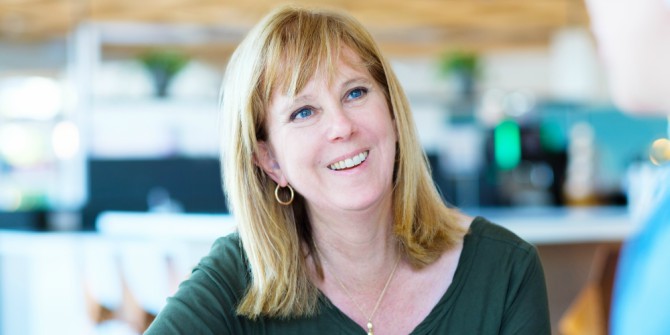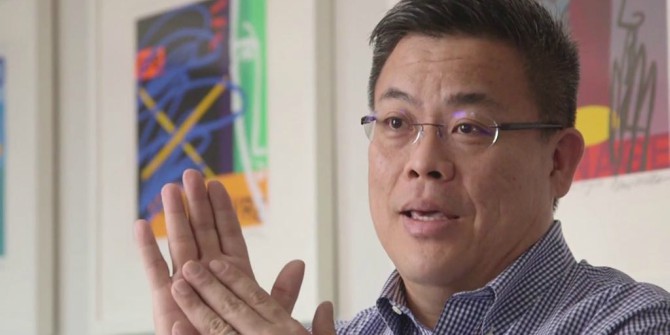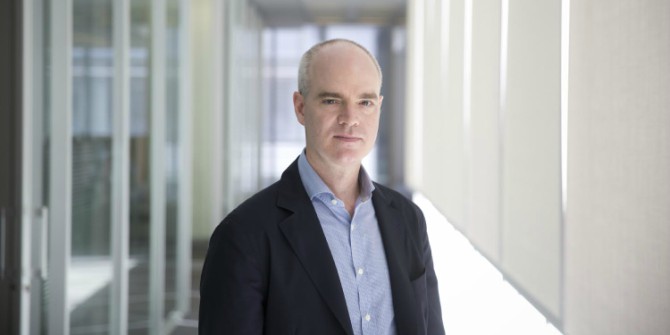
In the era when Amazon can deliver a product within two hours and social media and online review sites provide a megaphone for disaffected consumers, no manager can consider herself sane if she is not listening closely to the company’s customers. As co-founder and president of Medallia, a customer experience management (CEM) software provider, Amy Pressman knows first hand how important this is for the survival of corporations being chewed at the heels by much smaller, and often nimbler, start-ups. ‘The really disruptive companies are ingesting a tonne of data from customers’, she told LSE Business Review’s managing editor, Helena Vieira. The interview took place on 7 November during Web Summit, in Lisbon.
Can you explain what Medallia does?
We make companies way more customer-centric, way more customer-obsessed. If you think about what’s happening today, how customers expectations are rising because of Amazon, existing companies need to get much, much better at anticipating what their customers’ needs are going to be and then adapting to meet them, because if they don’t there are 100 startups ready to come in and take over and just disrupt their industry.
We take all this data about customer experience, survey data, social media data, any data about the customer from systems that the company might have, like customer relationship management (CRM) systems, point of sale (POS) systems, call centre systems. We bring all that in, do analytics on it, and we distribute it out so that everybody in the organisation knows their impact on their customer experience and is empowered to take action on it. You’re turning the company’s scale into a real advantage and enabling everybody to start systematically dealing with customers who are at risk, identifying problems and fixing them, and then identifying areas for innovation and innovating.
Can you give me an example?
I think this is a universal thing, but telcos are generally not well loved by customers. We work with a number of them. One company decided they would be the customer experience leader in telecommunications. They’ve been on a multi-year journey now, having started about 1,5 years to 2 years ago. They implemented Medallia’s software and 130 thousand new users are logging in daily. Within one year, they improved employee engagement by 20 points in the Employee Net Promoter Score, which asks employees if they’d recommend the workplace to a friend. They also reduced call volume by 25 million calls.
The coolest thing for me personally is that employee engagement skyrocketed and apparently the churn in their call centre went down by 50 per cent because, imagine working in a call centre and you’re just getting calls of angry customers all day long and it’s just like you’re cannon fodder. Suddenly it goes from being bad to being able to help people and solve their problem. These employees started reporting, “My marriage got better. I used to come home grumpy and irritable and now I come home with energy”. It’s sort of a virtuous cycle, when you’re doing right by the customer you’re also making it a better place for employees because nobody wants to work for a company that everybody hates.
So you’re essentially a data analytics company…
We try and avoid all buzzwords. The problem that I have with the label “data” is that it’s really about taking action. You can have all the data, all the insights, if you don’t do anything with it, it doesn’t matter. What you need to do is unleash people within companies to start taking action to systematically fix problems and innovate to add new value. To me we’re the data and action company.
So it’s more about analysing it and coming up with a strategy?
No, we’re software and we just push this data out to the different parts of the organisation so that you can have everyone using it, from frontline people all the way up to the CEO. And that’s what happens. When we work with large companies, with typically 100 thousand users or more, you truly do help everybody. They do different cuts of the data. Some employees are much more on mobile, so we have a mobile app that’s even more addictive than Twitter. Some people are more at their desk, so we have a desktop application. Really what we’re about is making it so that when you’re going about your everyday business you have the voice of the customer in your head and you’re making decisions with that in mind. If you think about the companies that are really disruptive, they’re ingesting a tonne of data from customers, and they’re innovating, improving based on that data. That is what we help other companies do.
One of the issues with data today is that there’s so much of it. But how do you figure out what’s important?
The mere fact that they have information about how they’re doing and how the customers see them, helps them improve…
Yes. One of the issues with data today is that there’s so much of it. But how do you figure out what’s important? One of the things that we do is by chunking it up and then feeding the data to different parts of the organisation so that you’re personally seeing the data that is relevant to your job. It makes it much more accessible and usable than if you have to go find that gem for you in a big mountain of other data.
You don’t like labels but you’re a SaaS (software as a service) company…
We were a SaaS company before it was called SaaS. I think the idea is that as opposed to on-prem (software hosted on each company’s servers, on premises), you’re able to upgrade the software in real time, continuously, and deliver improvements to your customers. I think that’s the huge advantage that it’s in the cloud, versus you having to go in and change that software.
Your clients rely on software designed by you and how do you know that you’re serving their particular needs?
This category, customer experience management, is really exploding. When we started there were the early adopters that were trying it out, and today I would say that we’re in the early maturity of the adoption curve. The reason that it’s exploding is that customer experience is essentially your brand. Think about how you go and buy. Chances are you relied a lot more on the brand name 10, 15 years ago. Today most consumers will spend a lot of time on ratings and reviews sights. If they find those ratings and reviews to be credible then they use that as a basis for their purchase decision. What we see happening is a real demand for the software and what we see from customers coming to us is that we’re the largest customer experience management company. We essentially pioneered the space.
We had 3 billion transactions that ran through us last year alone and they’re looking to us for thought leadership. How do I set up a programme? How do I get the most value out of this and drive the most action that is going to be beneficial for our company and our customers? Where there’s variation it’s often by industry. There are different vernaculars in different industries. So what we’ve gone ahead and done is taken years of best practices in these industries and created best practice packages, one for retail, one for hospitality, and also for use cases like contact centres. The vast majority of customers really want that. Sometimes they’ve had existing programmes and they want some continuity between what they’ve done and what we’re doing so we can always configure to meet their needs. But what we’re really seeing versus in the early days when it was like you had to build it for each individual customer, there’s a huge appetite for “tell us what you know” and maybe we’ll tweak it a little bit for our particular needs.
I always ask about privacy, because it’s a big issue in this day and age. Have we gone too far with how much private data companies are collecting and analysing?
I hear your macro concerns about data privacy and I share them, but when people post on social media they’re not trying to be private. They’re actually trying to broadcast their opinions about things. I think that’s really what we’re seeing and when they answer surveys they want feedback from companies. Customers expect our surveys to be used by the company, otherwise they wouldn’t share their views. And with social media, by definition, they want to put it out there in the public domain. We’re very concerned about data privacy, but I do think that the data that we’re capturing directly from the customer is what they want the company to hear and act on.
One of the organisations we work with is the Department of Veterans Affairs, the VA. They use Medallia with the goal of delivering better care at a more rapid pace. Now there’s a bill winding its way through Congress that would keep this data anonymous, without even giving citizens the option to say, ‘I don’t want it to be anonymous. I want someone to contact me.’ With anonymity, there’s no way to act on this feedback to get back to the citizen. There’s a difference between engaging in a conversation vs. mining data that people never intended to be used in that way.”
I work with a bunch of men who are very upset about what they’re hearing and I see them doing incredible things.
Who is your typical client? Small firm, large corporation?
Large corporation. We’re helping large corporations become nimble, agile, competitive into the 21st century. If you think about it, there’s a compression of the business cycle. Everything is moving faster. Size isn’t quite the advantage that it might have been 10, 20 years ago. We’re helping large companies pivot, leverage their size to become even better at innovating because they’ve got more people out talking to more customers, getting more ideas. Some examples are Marriott, Hilton, Tory Burch, Kate Spade and Mercedes-Benz. They’re large, often global organisations. And we’ll often have over 100,000 users on our system, logging in regularly to understand their customers’ experience.
I want to ask you about women in Silicon Valley. Are you worried about this whole situation of sexual harassment and women finding it difficult to break the glass ceiling?
I worked on Capitol Hill prior to going to business school. I worked briefly in financial services and now I work in Silicon Valley. Unfortunately I don’t think that this is a situation isolated to Silicon Valley and you see it in some of the allegations that are coming out about media executives and government officials. So I just don’t think it’s an isolated problem. I personally have been really heartened by the response that I’ve seen in our company, from our investors, to try and get at the root of some of these problems. And I’m not here talking about sexual harassment specifically, but talking about getting more women into more senior positions.
I think once you have more balance at the senior levels there’s less of this behaviour. We started doing unconscious bias workshops in our company at the requirement of one of the senior guys in our engineering department. We started sharing that workshop with a whole bunch of other companies and there has been so much energy amongst the men and women that I work with to try and do something about this. I’m heartened by the response. I work with a bunch of men who are very upset about what they’re hearing and I see them doing incredible things.
Sequoia Capital, which is our investor, has also done a bunch of things, to set up a mentoring programme for women that a number of women in our company are participating in. So there’s a collective effort to do something about it. And I’m also glad frankly that people feel comfortable enough now to come out and start talking about it. This has always been happening in all industries. Even though it’s painful, I think the fact that there’s an open airing of it shows real progress.
So you think there’s momentum now?
I do. Keep in mind that I’m in a company that has a woman co-founder, that has two women on the board, so I may be the anomaly but in my environment I’m seeing tremendous attention to this and focus on it. In the US in particular there are some systemic issues. I’ve lived all over the world as well. There are systemic issues that make it harder for women for example to stay fully in the workforce when they start having kids. It’s easier when you’re in Europe, for example. There’s more of an infrastructure to support that. So there are some other issues that are beyond just companies and industries.
♣♣♣
- This Q&A is part of a series of interviews during the Web Summit conference in Lisbon, 6-9 November 2017. The conversation was edited for clarity and brevity.
- The post gives the views of the interviewee, not the position of LSE Business Review or of the London School of Economics and Political Science.
- Featured image credit: Courtesy of Medallia. Not under a Creative Commons licence. All rights reserved.
- When you leave a comment, you’re agreeing to our Comment Policy.





